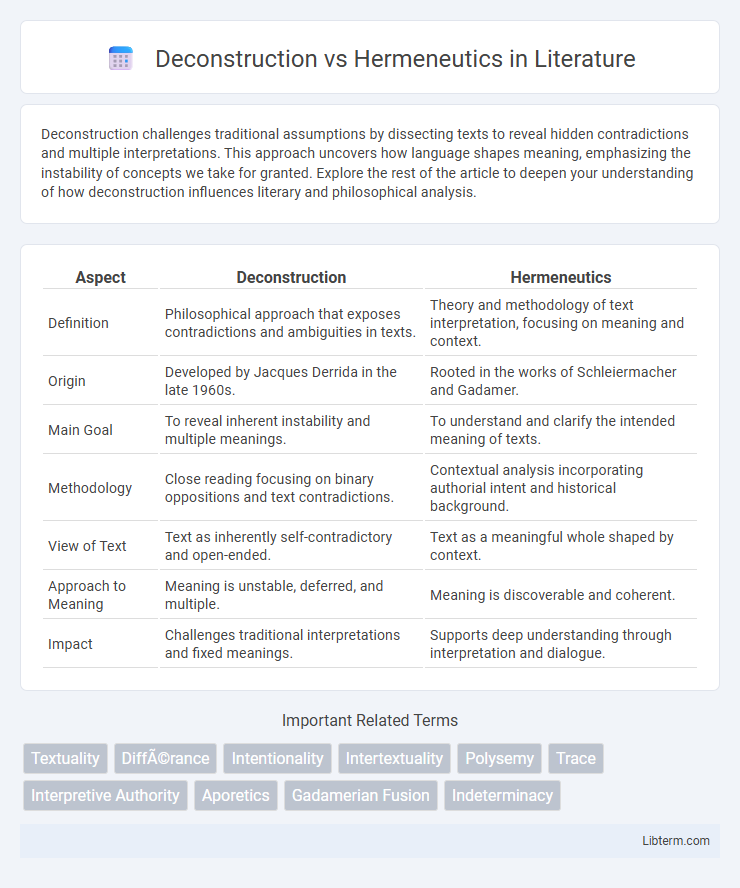Deconstruction challenges traditional assumptions by dissecting texts to reveal hidden contradictions and multiple interpretations. This approach uncovers how language shapes meaning, emphasizing the instability of concepts we take for granted. Explore the rest of the article to deepen your understanding of how deconstruction influences literary and philosophical analysis.
Table of Comparison
| Aspect | Deconstruction | Hermeneutics |
|---|---|---|
| Definition | Philosophical approach that exposes contradictions and ambiguities in texts. | Theory and methodology of text interpretation, focusing on meaning and context. |
| Origin | Developed by Jacques Derrida in the late 1960s. | Rooted in the works of Schleiermacher and Gadamer. |
| Main Goal | To reveal inherent instability and multiple meanings. | To understand and clarify the intended meaning of texts. |
| Methodology | Close reading focusing on binary oppositions and text contradictions. | Contextual analysis incorporating authorial intent and historical background. |
| View of Text | Text as inherently self-contradictory and open-ended. | Text as a meaningful whole shaped by context. |
| Approach to Meaning | Meaning is unstable, deferred, and multiple. | Meaning is discoverable and coherent. |
| Impact | Challenges traditional interpretations and fixed meanings. | Supports deep understanding through interpretation and dialogue. |
Introduction to Deconstruction and Hermeneutics
Deconstruction, pioneered by Jacques Derrida, challenges traditional interpretations by exposing inherent contradictions and ambiguities within texts, emphasizing the instability of meaning. Hermeneutics, rooted in the works of Friedrich Schleiermacher and Hans-Georg Gadamer, focuses on the art of interpretation, seeking to uncover the intended meanings through historical and contextual analysis. Both approaches redefine understanding but diverge in methodology: deconstruction destabilizes meaning while hermeneutics aims to restore it through dialogue with the text.
Historical Origins and Philosophical Roots
Deconstruction emerged from Jacques Derrida's critique of structuralism in the late 1960s, emphasizing the instability of meaning and the inherent contradictions in texts. Hermeneutics traces back to ancient Greek philosophy, notably Aristotle and Plato, evolving through the work of 19th-century thinkers like Friedrich Schleiermacher and Wilhelm Dilthey, focusing on interpreting texts within their historical and cultural contexts. While deconstruction challenges fixed interpretations by revealing ambiguities, hermeneutics seeks to uncover the intended meaning through contextual understanding and methodological analysis.
Key Thinkers: Derrida vs. Gadamer
Deconstruction, pioneered by Jacques Derrida, challenges traditional structures of meaning by exposing inherent contradictions and the instability of language, emphasizing the fluidity of texts and the impossibility of fixed interpretations. Hermeneutics, advanced by Hans-Georg Gadamer, focuses on the interpretative process as a dialogue between the text and the reader's historical context, highlighting the fusion of horizons to create meaning. While Derrida deconstructs texts to reveal hidden ambiguities, Gadamer stresses the continuity of tradition and the role of pre-understanding in shaping interpretation.
Core Concepts and Definitions
Deconstruction centers on exposing contradictions and ambiguities within texts to reveal multiple meanings, emphasizing the instability of language and rejecting fixed interpretations. Hermeneutics focuses on the theory and methodology of interpretation, aiming to uncover the author's intended meaning and historical context through a structured understanding process. These core concepts highlight deconstruction's challenge to traditional meaning, while hermeneutics seeks coherent comprehension and synthesis of textual significance.
Deconstruction: Methods and Approaches
Deconstruction, pioneered by Jacques Derrida, critically examines texts by exposing inherent contradictions and ambiguities to reveal multiple, often conflicting interpretations. Its methods include close reading, "differance," and the dismantling of binary oppositions to challenge fixed meanings and traditional hierarchies in language. This approach fundamentally alters how meaning is constructed, emphasizing interpretive openness and the instability of language.
Hermeneutics: Methods and Approaches
Hermeneutics employs interpretive methods such as the hermeneutic circle, where understanding develops through the interplay between parts of a text and the whole, emphasizing context and authorial intent. Key approaches include phenomenological hermeneutics, which focuses on the lived experience of meaning, and dialogical hermeneutics, highlighting the role of dialogue between the interpreter and the text. These methods aim to uncover deeper layers of meaning, contrasting with deconstruction's emphasis on inherent contradictions and text instability.
Textual Interpretation: Contrasts and Comparisons
Deconstruction challenges traditional textual interpretation by exposing inherent contradictions and destabilizing meaning within texts, emphasizing the fluidity and multiplicity of interpretations. Hermeneutics prioritizes understanding the intended meaning through context, authorial intent, and historical background, seeking coherence and depth in the text. While deconstruction de-emphasizes fixed meanings, hermeneutics aims to reconstruct a unified interpretation, highlighting contrasting approaches to textual analysis.
Impact on Literary Theory and Criticism
Deconstruction challenges traditional literary theory by revealing inherent contradictions and questioning fixed meanings in texts, thereby shifting critical focus to language's instability and reader interpretation. Hermeneutics emphasizes understanding texts through historical context and authorial intent, fostering a dialogic engagement between the reader and the text. The impact on literary criticism involves a tension between deconstruction's skepticism of definitive interpretations and hermeneutics' commitment to uncovering coherent meaning, influencing diverse analytical approaches from post-structuralism to reader-response theory.
Contemporary Relevance and Applications
Deconstruction challenges traditional texts and ideologies by exposing inherent contradictions, influencing contemporary literary theory, cultural studies, and critical theory to question fixed meanings. Hermeneutics emphasizes interpretation and understanding of texts within historical and cultural contexts, remaining vital in legal studies, theology, and social sciences for extracting nuanced meanings. Both approaches shape modern discourse analysis, promoting critical engagement with language, power structures, and meaning-making processes in diverse fields.
Conclusion: Bridging Deconstruction and Hermeneutics
Bridging deconstruction and hermeneutics involves recognizing that both approaches interrogate texts to uncover multiple layers of meaning beyond surface interpretation. Deconstruction challenges fixed meanings and exposes inherent contradictions, while hermeneutics seeks coherent understanding through contextual analysis and dialogue with the text. Integrating these methodologies enhances critical thinking by allowing flexible interpretation that acknowledges textual instability without abandoning the pursuit of meaningful comprehension.
Deconstruction Infographic

 libterm.com
libterm.com